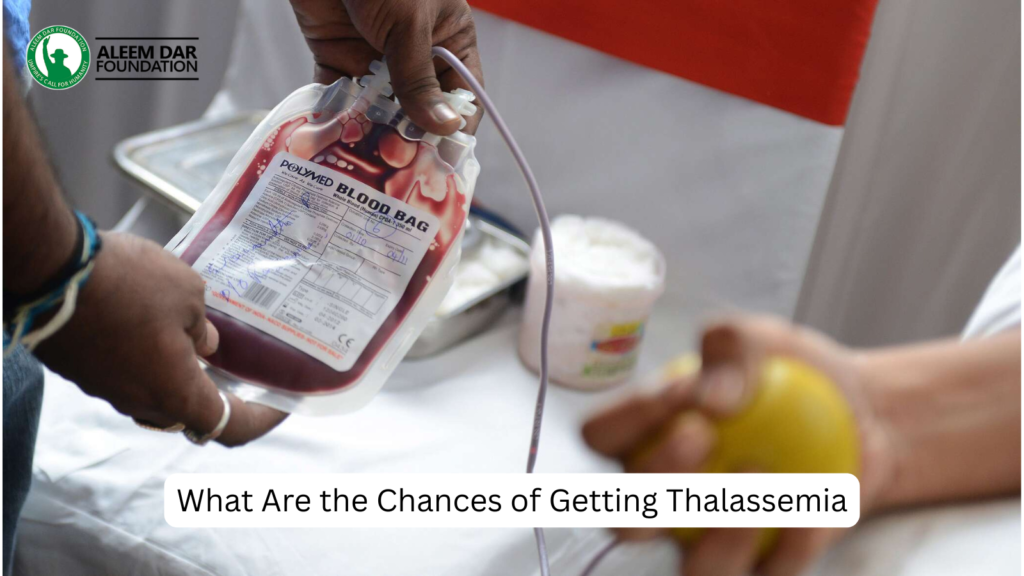What Are The Chances Of Getting Thalassemia

Introduction
Thalassemia is a blood disorder that is inherited from family blood. It is not like the flu or fever. It is a genetic disease. This means it passes from parents to children. If both parents have the thalassemia trait, then the child has a high chance of getting thalassemia major. If only one parent has the trait, then the child may not have thalassemia major but can still carry the trait.

Thalassemia Situation in Pakistan
In Pakistan, the numbers are very serious. Research shows that around 5 to 8 percent of the total population are carriers of thalassemia. That means almost 1 out of every 20 people carries this trait. Every year, about 5,000 babies are born in Pakistan with thalassemia major. This is a very big number for our country. The sad part is that many families do not know about this problem before marriage.
Chances of Getting Thalassemia
Now, let us understand how the chances are counted.
- If none of the parents are carriers, the child is safe.
- If one parent has the trait, the child may carry but will not have thalassemia major.
- If both parents are carriers, then:
- There is a 25 percent chance the child will be normal.
- There is a 50 percent chance the child will be a carrier.
- There is a 25 percent chance the child will have thalassemia major.
- There is a 25 percent chance the child will be normal.
Thalassemia major is very serious. Children who get this need blood transfusions again and again in their lives.
Problems Faced by Patients
Blood transfusion is a painful process for small children. Families face stress because of it. In Pakistan, around 100,000 children are already living with thalassemia major. Every month, these children need blood. Without blood, their life becomes very difficult. Families also need money for medicines to remove extra iron in the body. Without medicines, patients can face more problems like liver and heart issues.
Awareness and Prevention
Thalassemia is not contagious. You cannot get it by meeting or touching someone. It only comes through family blood. The best prevention is awareness and testing before marriage. In some countries, premarital screening is compulsory. In Pakistan, people are slowly realizing this, but more awareness is needed in villages and towns.
Social and Emotional Impact
Thalassemia is not just a medical problem. It is also a social problem. Families with thalassemia patients face challenges in education, jobs, and daily life. Children go through painful treatments. Parents go through stress. The whole family suffers. This is why prevention is better than treatment.
Quick Facts
- 5 to 8 percent of Pakistanis carry the trait
- 5,000 babies are born with thalassemia every year
- 25 percent chance of thalassemia major if both parents are carriers
- Around 100,000 patients are living with thalassemia major in Pakistan.
FAQs
Q1: Can thalassemia be cured?
No, thalassemia major has no permanent cure except a bone marrow transplant, which is very costly. Regular blood transfusions and medicines help patients to live longer.
Q2: How can I know if I am a carrier?
A simple blood test called CBC and hemoglobin electrophoresis can tell if a person is a carrier of thalassemia.
Q3: Is thalassemia spreading in Pakistan?
Yes, around 5,000 new cases are reported every year in Pakistan. The main reason is a lack of awareness and the lack of compulsory premarital blood screening.
Conclusion
Aleem Dar Foundation is working with great effort to support thalassemia patients in Pakistan. The foundation helps in blood donation, creating awareness, and giving hope to families. It spreads the message that prevention is better than treatment. Simple testing before marriage can save many lives and stop this disease from passing to the next generation.
If you want to make a change, stand with Aleem Dar Foundation. Your small step can save a life. Your blood can give life to a child. Your support can bring smiles to families who are fighting every day. Let us join hands with love and kindness. Together, we can build a Pakistan where no child suffers from thalassemia.
